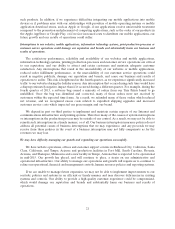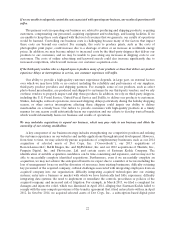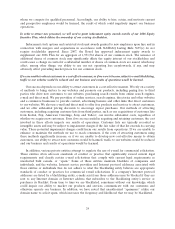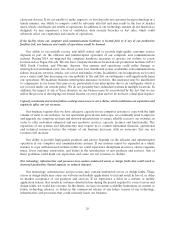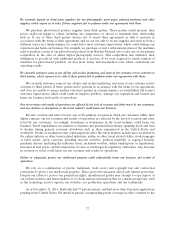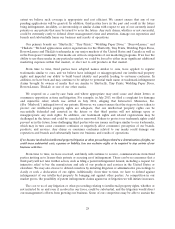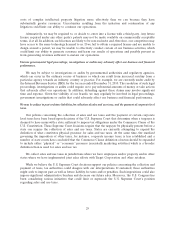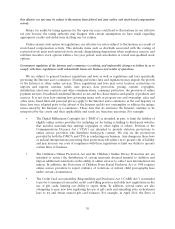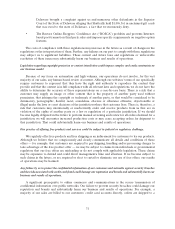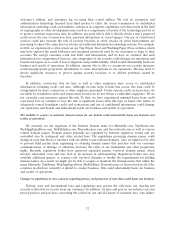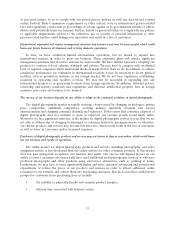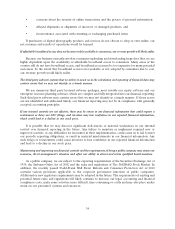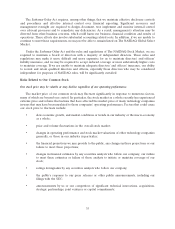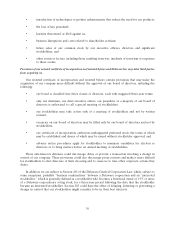Shutterfly 2014 Annual Report Download - page 31
Download and view the complete annual report
Please find page 31 of the 2014 Shutterfly annual report below. You can navigate through the pages in the report by either clicking on the pages listed below, or by using the keyword search tool below to find specific information within the annual report.Our effective tax rate may be subject to fluctuation from federal and state audits, and stock-based compensation
activity.
Future tax audits by taxing agencies for the open tax years could lead to fluctuations in our effective
tax rate because the taxing authority may disagree with certain assumptions we have made regarding
appropriate credits and deductions in filing our tax returns.
Under current stock option tax regulations, our effective tax rate is subject to fluctuations as a result of
stock-based compensation activity. This includes items such as shortfalls associated with the vesting of
restricted stock units and restricted stock awards, disqualifying dispositions when employees exercise and
sell their incentive stock options within a two year period, and cancellation of vested non-qualified stock
options.
Government regulation of the Internet and e-commerce is evolving, and unfavorable changes or failure by us to
comply with these regulations could substantially harm our business and results of operations.
We are subject to general business regulations and laws as well as regulations and laws specifically
governing the Internet and e-commerce. Existing and future laws and regulations may impede the growth
of the Internet or other online services. These regulations and laws may cover taxation, restrictions on
imports and exports, customs, tariffs, user privacy, data protection, pricing, content, copyrights,
distribution, electronic contracts and other communications, consumer protection, the provision of online
payment services, broadband residential Internet access and the characteristics and quality of products and
services. It is not clear how existing laws governing issues such as property use and ownership, sales and
other taxes, fraud, libel and personal privacy apply to the Internet and e-commerce as the vast majority of
these laws were adopted prior to the advent of the Internet and do not contemplate or address the unique
issues raised by the Internet or e-commerce. Those laws that do reference the Internet continue to be
interpreted by the courts and their applicability and reach are therefore uncertain. For example:
• The Digital Millennium Copyright Act (‘‘DMCA’’) is intended, in part, to limit the liability of
eligible online service providers for including (or for listing or linking to third-party websites
that include) materials that infringe copyrights or other rights of others. Portions of the
Communications Decency Act (‘‘CDA’’) are intended to provide statutory protections to
online service providers who distribute third-party content. We rely on the protections
provided by both the DMCA and CDA in conducting our business. Any changes in these laws
or judicial interpretations narrowing their protections will subject us to greater risk of liability
and may increase our costs of compliance with these regulations or limit our ability to operate
certain lines of business.
• The Children’s Online Protection Act and the Children’s Online Privacy Protection Act are
intended to restrict the distribution of certain materials deemed harmful to children and
impose additional restrictions on the ability of online services to collect user information from
minors. In addition, the Protection of Children From Sexual Predators Act of 1998 requires
online service providers to report evidence of violations of federal child pornography laws
under certain circumstances.
• The Credit Card Accountability, Responsibility and Disclosure Act (‘‘CARD Act’’) is intended
to protect consumers from unfair credit card billing practices and adds new regulations on the
use of gift cards, limiting our ability to expire them. In addition, several states are also
attempting to pass new laws regulating the use of gift cards and amending state escheatment
laws to try and obtain unused gift card balances. For example, in April 2014, the State of
30



